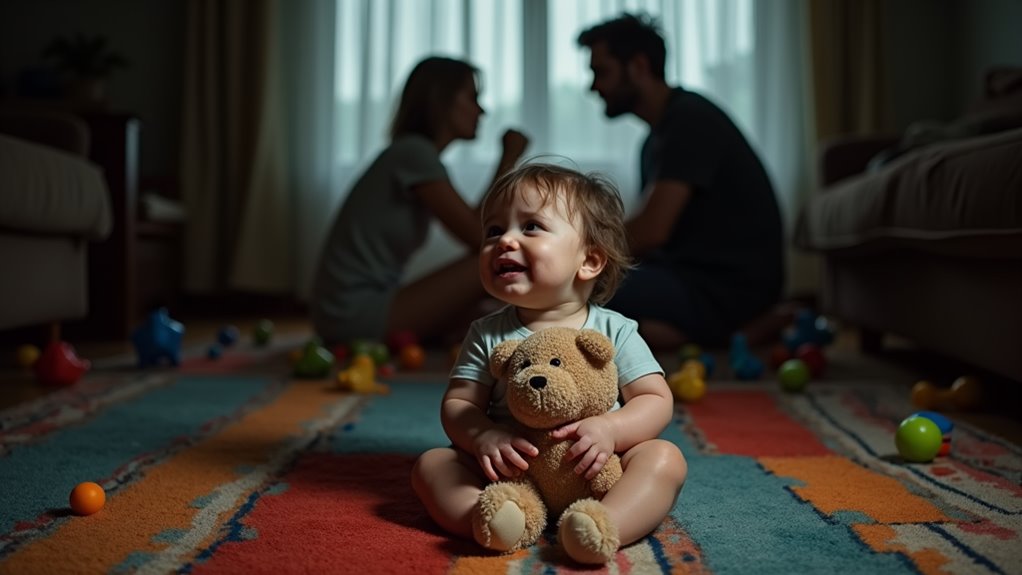Family conflict can really shake up a child's world. When things get tense at home, kids often feel anxious or withdrawn, soaking up all that stress like a sponge. They might struggle to make friends or find it hard to focus on school. Plus, some kids may act out or become overly sensitive. This can affect their ability to solve problems and think creatively, too. The good news? Open communication and problem-solving skills can help. With a sprinkle of humor and a dash of empathy, families can lighten the atmosphere and work through differences, which you might find pretty interesting!
Understanding Family Conflict
Family conflict often arises from misunderstandings, differing values, or unmet needs, and it can greatly impact a child's emotional and psychological well-being. When families argue, it's like a storm brewing in the living room. You might feel confused, anxious, or even caught in the middle, which isn't fun at all.
Every family has its own way of handling disagreements. Sometimes, it's just about who gets the last slice of pizza, but other times, it's a deep-rooted issue that keeps bubbling up. You might wonder why your parents can't see things your way, or why they don't agree on important topics.
These conflicts can make you feel like you're walking on eggshells, trying to avoid triggering another argument. Understanding family conflict is essential. It helps you see that it's not always your fault and that everyone has different perspectives.
If you can talk about these issues openly, it might just clear the air. Remember, it's okay to express your feelings. After all, just like a superhero, you too can help bring peace back to your family. So, hang in there, and don't be afraid to share what's on your mind!
Emotional Well-Being of Children
When conflicts arise at home, children can often feel the emotional weight of the situation. It's like carrying a heavy backpack filled with worries! You might notice that your child becomes more anxious or withdrawn during these tough times.
It's important to understand that kids absorb the feelings around them, even if they don't fully understand what's happening. When you're arguing or feeling upset, your child may worry about what it means for your family. They might feel sad, scared, or even guilty, thinking they could somehow fix things.
This emotional turmoil can lead to trouble sleeping or changes in their mood. You might also find that their behavior changes. Maybe they're acting out more, or they seem more sensitive than usual. It's like they're trying to express all those bottled-up feelings.
Encouraging open communication can help! Let them know it's okay to share their feelings. You can also reassure them that while conflicts are a part of life, they don't define your family.
Effects on Social Skills
Conflicts at home can greatly impact a child's social skills. When you're surrounded by tension, it can be hard to feel comfortable making friends or talking to others. You might notice that kids from homes with a lot of fighting may not know how to share, take turns, or even express their feelings. It's like trying to learn a dance while the music is all out of tune!
When kids see conflict, they might become shy or withdrawn, thinking that talking to others isn't safe. On the other hand, some might become overly aggressive, believing that being tough is the only way to get attention. This confusion can make it difficult for them to develop healthy relationships or understand social cues, like reading body language or knowing when to listen.
It's important to remember that social skills are like a toolbox—you need the right tools to build friendships. If a child's toolbox is missing some items, like empathy or communication skills, it can be really tough to connect with others.
Helping kids feel safe and supported at home is key to ensuring they develop the social skills they'll need throughout life.
Cognitive Development Challenges
Cognitive development can suffer considerably in children exposed to ongoing family conflict. When there's tension at home, kids often find it hard to concentrate on schoolwork or even remember what they learned. Imagine trying to solve a math problem while a loud argument's happening in the next room. It's tough, right?
Kids in these situations might also struggle with problem-solving skills. They may become so worried about family issues that they can't focus on finding solutions to their everyday challenges.
Plus, their creativity might take a hit, too. When stress fills the home, there's often less room for imagination and play, which are super important for thinking outside the box.
Furthermore, children might develop a fear of failure, leading them to avoid challenges. They might think, "Why even try if I'll just mess up?" This mindset can stifle their ability to learn and grow.
It's essential to recognize these cognitive challenges because they can impact a child's future. By addressing family conflicts, you help create a more supportive environment where kids can thrive academically and creatively.
Let's work together to make home a happier place!
Long-Term Psychological Impact
Around 25% of children exposed to family conflict will face long-term psychological issues that can affect their emotional and social development.
Imagine trying to build a sandcastle at the beach, but big waves keep crashing down. That's what it's like for kids dealing with constant fighting at home. They can struggle with feelings of anxiety and sadness, making it hard to enjoy life.
When you grow up in a tense environment, you might find it tough to trust others. You could also feel like you're walking on eggshells, worried about what might set someone off. This anxiety can stick around, even when things get better at home.
Kids might also find it hard to express their feelings. Just think about how confusing it can be when your emotions are all jumbled up!
But there's hope! With support, many kids learn to cope and heal. Therapy, understanding friends, and a caring family can help you build a stronger emotional foundation.
Behavioral Issues in Children
Children exposed to family conflict often display a range of behavioral issues that can disrupt their daily lives. You might notice them acting out more, whether it's through tantrums, aggression, or withdrawal from friends and activities. These behaviors can feel like a rollercoaster ride, leaving you dizzy and a bit confused!
Sometimes, kids might struggle with feelings of sadness or anxiety, which can show up as trouble concentrating in school or refusing to try new things. It's like they're carrying a heavy backpack filled with worries, making it hard to focus on anything else.
Additionally, some kids may start to mimic the conflict they see at home. If they witness yelling, they might think that's how to communicate, leading to more arguments with friends or siblings.
It's important to remember that these behaviors are often cries for help, not just mischief.
If you see these signs, try to talk with your child about their feelings. Encouraging open conversations can help them navigate through this challenging time.
After all, you want to keep their hearts light and their smiles bright, even when family life gets a bit bumpy!
Role of Parenting Styles
Different parenting styles can greatly influence how children respond to family conflict. For instance, if you're an authoritative parent, you might encourage open communication, helping your kids express their feelings during tough times. This can make them feel heard and loved, which is super important.
On the flip side, if you're more authoritarian, your kids might feel scared to speak up, fearing punishment. This can lead to them bottling up emotions, which isn't healthy at all.
Permissive parents often let their kids do what they want, but this can leave children feeling confused during conflicts. They mightn't learn how to handle disagreements effectively.
Meanwhile, uninvolved parents might be so wrapped up in their own issues that they overlook their kids' needs during family conflicts. This can leave children feeling neglected and alone, which isn't fun.
In short, the way you parent can shape how your kids handle conflicts. By being supportive and guiding them through tough times, you'll help them build resilience.
After all, teaching them how to deal with family squabbles now can prepare them for the bigger battles they'll face later in life!
Influence of Conflict Resolution
While maneuvering through family conflicts, the ability to resolve disputes effectively can considerably shape a child's emotional and social development. When you handle disagreements calmly, your child learns valuable lessons. They see how to communicate, share feelings, and work toward solutions. It's like giving them a toolbox filled with skills they'll need later in life.
Imagine a family argument about dinner plans. If you shout and blame, your kid might think that's how you solve problems. But if you calmly discuss options, they'll see that talking things out is much more effective—like magic! They'll feel safe expressing their opinions and emotions.
Conflict resolution also teaches empathy. When you acknowledge each other's feelings, it shows kids that everyone has a point of view. They learn to understand and respect differences, which is super important for making friends.
In the end, how you resolve conflicts sets the stage for your child's future relationships. So, the next time tempers flare, remember: you're shaping a future problem-solver. And who knows, maybe they'll even help you pick dinner next time!
Strategies for Mitigation
Mitigating family conflict requires proactive strategies that foster a harmonious environment. First, make time for family activities that everyone enjoys. Whether it's game night, movie marathons, or outdoor adventures, these moments create bonds and lighten the mood.
Next, establish ground rules for discussions. Agree on respectful communication, even when you disagree. No shouting or name-calling allowed! Remember, it's about the issue, not attacking each other.
Another great strategy is to encourage empathy. Teach kids to see things from others' perspectives. You might say, "How would you feel if someone said that to you?" This simple question can work wonders.
Additionally, practicing mindfulness can help you manage stress during conflicts. Try deep breathing exercises together when emotions run high. It's like hitting the pause button before reacting.
Lastly, don't forget to celebrate small victories. When you resolve a disagreement without drama, give yourselves a high-five! Recognizing progress helps everyone feel more motivated to keep working on staying positive.
With these strategies, you can create a family atmosphere where love and understanding thrive, even when things get a little rocky!
Importance of Communication
Effective communication is key to maintaining a healthy family dynamic, especially when managing conflicts. When you talk openly and honestly with your family, it helps everyone understand each other better.
Think of it as building a bridge; without clear communication, that bridge might just collapse!
When conflicts arise, don't shy away from discussing your feelings. Instead, share what's on your mind. Use "I" statements, like "I feel upset when…" This way, you focus on your feelings rather than blaming others. It makes it easier for everyone to listen without getting defensive.
Listening is just as important as talking! Show your family you care by really hearing what they've to say. Nodding or giving a thumbs up can show you're engaged.
And hey, don't forget to have a little fun with it! A light-hearted joke here and there can ease tension and remind everyone that you're all in this together.
Seeking Professional Help
Sometimes, a family's struggles with conflict can feel overwhelming, and that's when seeking professional help can make a significant difference. You might think that asking for help means you're failing, but it's quite the opposite! It shows you're willing to find solutions and create a happier home.
Therapists and counselors are like guides who can help everyone navigate tricky emotions and improve communication. They can teach your family new skills to handle disagreements better, like listening without interrupting or finding common ground. These skills aren't just for adults; kids can learn them too!
When you talk with a professional, you'll find a safe space to express feelings without fear of judgment. Plus, you might discover that many families face similar challenges. It's comforting to know you're not alone!
In the end, seeking help can spark positive changes. With time and effort, you can build a more peaceful family environment where everyone feels heard and valued.





